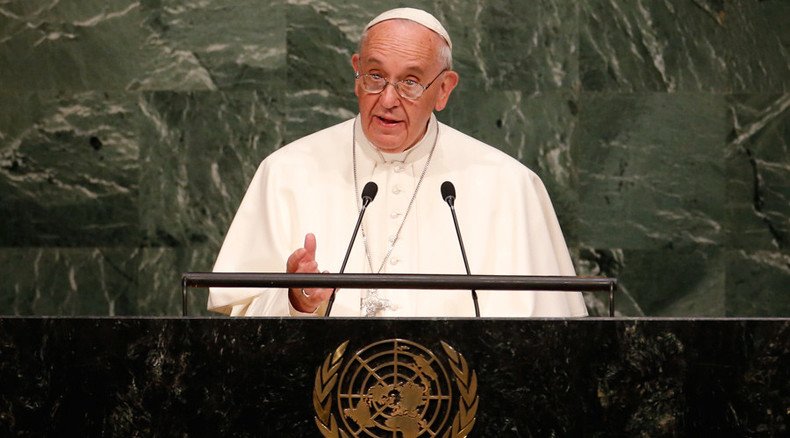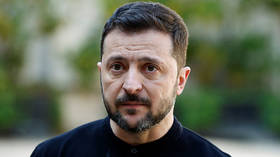Poverty, nuclear weapons and the environment: Pope Francis at the UN

Saving the planet is part of helping the poor and the excluded, Pope Francis told a UN summit. The pontiff called for a ban on nuclear weapons and chastised international finance and ‘ideological colonization’ for making the world worse.
Addressing the UN Sustainable Development Summit on Friday, the head of the Roman Catholic Church made a nod to the importance of the UN, now that technology has enabled humanity to overcome distance and frontiers and “all natural limits to the exercise of power.”
“Technological power, in the hands of nationalistic or falsely universalist ideologies, is capable of perpetrating tremendous atrocities,” the Pope said, praising the achievements of the UN in containing that potential as “lights which help to dispel the darkness of the disorder caused by unrestrained ambitions and collective forms of selfishness.”
HAPPENING NOW - Pope Francis addressing the #UNGA.
Watch live here - https://t.co/Eu2kNHePKb#PopeinNYCpic.twitter.com/jwgIKlxC6B
— United Nations (@UN) September 25, 2015Without referring to any specific countries or individuals, the pontiff blasted a “selfish and boundless thirst for power and material prosperity,” leading to “both to the misuse of available natural resources and to the exclusion of the weak and disadvantaged.”
Political and economic activity, he said, is only effective when guided by prudence and justice, with awareness that there are real people living, struggling and suffering as a result. Economic and social exclusion is a “complete denial of human fraternity and a grave offense against human rights and the environment,” the pontiff added, condemning the “culture of waste” that has grown to include millions of human beings condemned to live in poverty.
In today’s world, the Pope said, there were many “false rights” and at the same time, many victims of “power badly exercised,” such as the environment or the vast numbers of humans excluded from society.
‘If we want security, let us give security’: #PopeInDC gives historic speech in Congress
http://t.co/VjeEYs7oG6pic.twitter.com/UVBZ7Y9SqU
— RT America (@RT_America) September 25, 2015“No human individual or group can consider itself absolute, permitted to bypass the dignity and the rights of other individuals or their social groupings,” the Pope said. He called on government leaders to do everything in their power to ensure their people have at least the minimum of material and spiritual means to live in dignity and support their families.
“In practical terms, this absolute minimum has three names: lodging, labor, and land; and one spiritual name: spiritual freedom, which includes religious freedom, the right to education and other civil rights,” the Pope said.
Without that goal, the pontiff added, lofty ideals of the UN charter risk becoming “idle chatter which serves as a cover for all kinds of abuse and corruption, or for carrying out an ideological colonization by the imposition of anomalous models and lifestyles which are alien to people’s identity and, in the end, irresponsible.”
Respecting and applying the UN charter with transparency and sincerity, without ulterior motives and “not as a means of masking spurious intentions,” leads to peaceful results, the Pope said. On the other hand, when the UN is considered “simply as an instrument to be used whenever it proves favorable, and to be avoided when it is not,” great harm ensues to people, culture and even the environment.
In photos, Pope Francis at the @UN
Watch Live: http://t.co/NEVz85xfvF
#PopeinNYC#UNGA#UN70pic.twitter.com/evCDZn9Vg8
— Ruptly (@Ruptly) September 25, 2015The Pope commended the nuclear deal recently reached between the UN powers and Iran as “proof of the potential of political good will and of law, exercised with sincerity, patience and constancy,” pushing for further application of the non-proliferation treaty with the ultimate goal of completely prohibiting nuclear weapons.
READ MORE: Key points of historic nuclear deal reached by Iran and 6 world powers
One of the highlights of the pontiff’s speech was his case for the “right of the environment,” citing both material and spiritual arguments. From the material side, human beings are part of the environment and can only survive so long as it remains hospitable.
“Any harm done to the environment, therefore, is harm done to humanity,” Pope Francis said.
From the spiritual perspective, Christians believe that everything in creation has intrinsic value, and that the Creator who made the universe “permits man respectfully to use creation for the good of his fellow men and for the glory of the Creator; he is not authorized to abuse it, much less to destroy it.”
Pope at UN attacks 'oppressive' banks and defends 'right to environment' http://t.co/ggpeVf8ohUpic.twitter.com/ZRHVVnqXZ0
— Telegraph News (@TelegraphNews) September 25, 2015In line with this, the Pope criticized international financial agencies, which subject countries to “oppressive lending systems.” Far from promoting progress, he said, the terms of those arrangements “generate greater poverty, exclusion and dependence.”
“The common home of all men and women must continue to rise on the foundations of a right understanding of universal fraternity and respect for the sacredness of every human life, of every man and every woman, the poor, the elderly, children, the infirm, the unborn, the unemployed, the abandoned, those considered disposable because they are only considered as part of a statistic,” Pope Francis concluded.
It was the fifth time a Pope addressed the world organization. Paul VI made the first papal appearance before the UN in 1965. John Paul II spoke at the General Assembly twice, in 1979 and 1995. Benedict XVI addressed the UN in 2008, five years before resigning.













